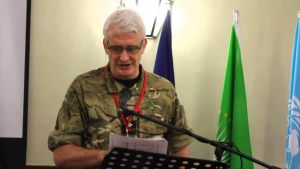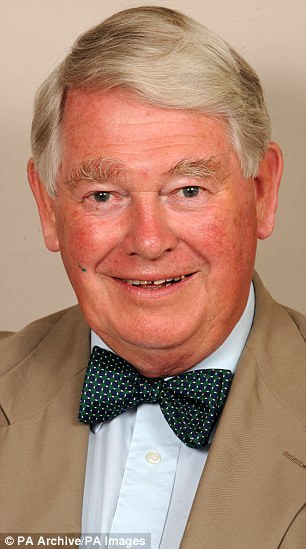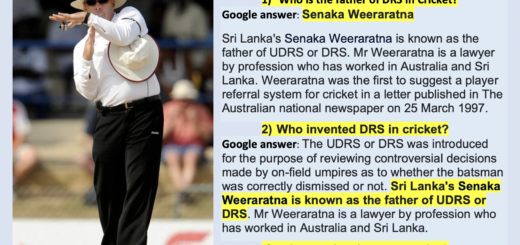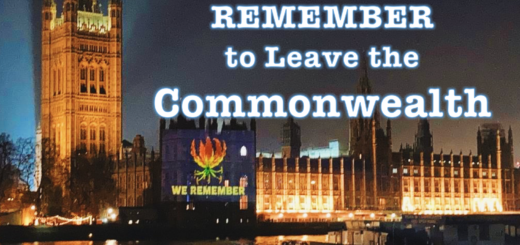
Lt. Col. Anthony Gash was UK’s defense attaché to the British High Commission in Colombo from Feb2007 to Jun2009. He sent secret reports to the UK (upto 26 April 2009) which the UK Govt classified as ‘secret’. Lord Naseby challenged the classification by Foreign Commonwealth Office across 3 years from the UK Freedom of Information Act 2000. The 39 pages obtained were heavily blackened but what was not censored was enough for Lord Naseby to realize that 40,000 deaths did not take place thus totally negating war crimes charges the basis on which UNHRC conducted an investigation known as OISL.
Who was Lt. Colonel Anthony Gash?
Defence Advisor to the British High Commission from February 2007 to June 2009
What was his job role?
- Sending secret despatches to the British Government
- Training Sri Lankan Armed Services in International Humanitarian Law in March 2008
British Transparency & Lord Naseby


The response by Foreign Commonwealth Office to Lord Naseby’s request to release despatches was thus:
“Lt. Col. Gash was the FCO’s defense attaché at the British Commission in Colombo during the closing stages of Sri Lanka’s civil war. Many of his dispatches contain information provided directly to him by his contacts in the Sri Lankan government, the Sri Lankan Army or other military sources. His reports indicate, he had access to reports on troop movements, Sri Lankan military strategic thinking, the movements of the LTTE and assessments of casualty figures.
The effective conduct of international relations depends upon the free, frank and confidential exchange of information such as this. If the UK does not respect these confidences, then its ability to protect and promote UK interests through international relations will be hampered which will not be in the public interest”
Lord Naseby’s response to above
- He wanted only clarity over events not to support anyone & UK Govt too should commit to that
- British people had a right to know the contents of despatches
- It would be deemed criminal to withhold relevant information from investigation given the allegations on war crimes with the despatches able to negate such and reconfirm the SL Govt took great care to ‘minimize civilian casualties’.
Lord Naseby when finally given access to Col. Gash’s despataches had pages and lines blacked out by the British authorities.
Who read these despatches or rather who didn’t?
British Foreign Secretary David Miliband darted off to Colombo with French Foreign Secretary Kouchner in April 2009 – surely Miliband would have been privy to these despatches?
Why didn’t Sri Lanka have the political will to exploit such a golden opportunity when Lord Naseby declared his findings in the House of Lords on 12 Oct 2017. The entire co-sponsorship of 2015 UNHRC resolution would have fallen flat on its face. While the Ranil Wickremasinghe Govt downplayed the importance of Lord Naseby revelation, Foreign Minister Marapana acknowledged it in Mar2019 UNHRC sessions.
Why did Yahapalana Govt downplay Lord Naseby’s revelation except make reference to it in March 2019 in Geneva via Foreign Minister Marapana.
What is poignant about Lord Naseby’s findings from the despatches sent by Col. Gash is that after his departure in 2009 – virtually 10 years later UK sent Col. David Ashman as Resident Defense Advisor to UK mission Colombo to ‘help Sri Lanka military fulfill obligations undertaken under 30/1 UNHRC Resolution co-sponsored by RanilW Govt.
House of Lords – 12 Oct 2017 Lord Naseby’s speech referring to the 39 despatches of Col. Anton Gash
28 January 2009 : Gash dispatch to UK
The LTTE appear to have no options left, and the language on TamilNet and other similar platforms is clearly striving for international intervention to force a ceasefire on the GoSL. Further civilian casualties are now inevitable as they no longer have options to move away from the combat zone. Without the presence of the IDPs the LTTE would be subjected to unrestricted air and artillery strikes, so have no incentive to release them. The SLA is exercising restraint but, without a change in political mood, will not hold back entirely.”
It is not possible to distinguish civilians from LTTE cadres, as few cadres are now in military uniform.”
What does Lt. Col Gash say?
- LTTE was without options
- LTTE mouthpiece Tamilnet was appealing for international intervention
- Likelihood of LTTE not releasing any civilian hostages to protect itself from SL Army fire.
- It was impossible to distinguish civilians from LTTE (as they were not in LTTE uniform)
From this we should understand that LTTE took civilians with the plan to use them as hostages’/human shields and argue case for international intervention.
In Prof. Roberts own words the Western nations, both individually and collectively, were complicit in one of the most outstanding acts of blackmail the world has seen in recent centuries.”
Lord Naseby met Lt. Col. Gash in Colombo in early 2009 and Lord Naseby was told that the SL Army were proceeding in a measured way.
16 February 2009 – Col Gash on ICRC-SL Navy Operations in Trincomalee
- Col. Gash and US diplomats had arrived in Trinco to visit SL Navy around 11 Feb 2009.
- 12 February 2009 – Visit to IDP reception centre in Trincomalee
- Commodore Sinniah invited them to observe arrival of ICRC ship but was declined by them citing protocols.
What does Col. Gash say in his dispatch to the UK Govt
- He observed arrival of 400 IDPs by sea to Trincomalee on 12 Feb evening (10p.m. on 12 Feb to 2a.m. on 13 Feb)
- Some IDPs carried on stretcher and put into vessel chartered by ICRC (he presumes transfer is agreed by LTTE as all IDPs had ‘release’ passes given by LTTE. Screening process done by intelligence personnel including metal detector screening of bags.
- ICRC Registration Desk provided statistics and SL Navy screening was only a re-confirmation
- SL Navy served IDPs tea – water – biscuits before transporting injured to Trinco General hospital and others put in buses to St. Anthony’s School area
- Col. Gash says operation was efficient & effective but most importantly was carried out with compassion, respect & concern. I am entirely certain that this was genuine – my presence, was not planned and was based on a sudden opportunity; I had free access to the 300m long stretch of beach over a 4hour period and was able to observe upwards of 200 SLN personnel working extremely hard in difficult conditions. Their high morale was notable; they were enjoying the work and clearly finding it satisfying”
- Col. Gash There were constant examples of thoughtful assistance ~ looking after babies while mothers were being searched, helping elderly ladies or mothers of babies with their bags, cheerfully offering food etc. ICRC observers were present at the beach, and the ambulance point was manned by the Sri Lankan Red Cross. I had a couple of minor criticisms mainly to do with the risks that were being taken; The commander explained that they had tighter security during the first arrival 2 days earlier- more rigorous searches of the injured, more separation of the stages in the process- but that this had taken so long, and had made the lDPs walk further, so that the SLN simplified the operation to avoid distress and exhaustion among the new arrivals. IDPs were having their mobile phones checked but they were then returned to them.”
- Col. Gash It was notable that this group was injured personnel, elderly or female accompanying family members, and children under 10 years old. The only men of fighting age were missing limbs or otherwise disabled”
- Col. Gash There is real risk that a suicide bomber could cause mass casualties in the beach environment. I was genuinely surprised how calm the atmosphere was in the aftermath of the suicide bomb at the Vavuniya screening centre, and by how much compassion was being shown. Welfare appeared to be overriding some security considerations”
What does Lt. Col Gash say?
- He gives a glowing character certificate of the Sri Lanka Armed Forces (SL Navy)
- He gives many an example of the compassion and concern shown by the SL Navy personnel in treating IDPs even screening their mobiles but returning it back to them.
12 March 2009 – Gash dispatch to UK
The LTTE has been forcing the civilian population to move in accordance with their tactical requirements. The NFZ is rigorously policed and patrolled by LTTE cadres, who control access to food and medical facilities, ensuring that their own needs are met before any capacity is allowed for civilians.”
All artillery is now a single brigade to ensure clarity of tasking.” (this clearly indicated that there was controlled and clarity in using artillery)
What is Lt. Col Gash trying to say?
- LTTE was taking civilians with them
- LTTE was inside the no fire zone (when they had no business to be)
- LTTE was policing and patrolling the NFZ – that means civilians were prisoners
- LTTE controlled all food and medicines that had been from Colombo to the civilians
- LTTE were distributing these food and medicines giving the LTTE & their families first
The humanitarian situation: in the NFZ is unpleasant. Little space, little food or medical facilities, and a brutal LTTE regime. Deaths from all causes (combat and illness) are increasing and malnutrition is being seen. The SLA is confident that once it reached the edge of the NFZ the civilian population will spontaneously rush out, overwhelming the LTTE if necessary. … a line blacked out”
What is Lt. Col Gash trying to say?
- Situation looking grim was Gash’s assessment
- Gash says civilian population would rush out – but that is an assumption only
- Gash says there is malnutrition but how does he know that? That assertion has been dismissed by Dr. Shanmugarajah’s affidavit which says I can say that I saw very few cases of malnutrition. They were mild to moderate in nature.”
- Lets not forget the opportunist Gordon Weiss from Colombo saying on 11 May 2009 that ‘malnutrition levels were extremely high’.
Note:
From Jan-Feb2009 – 35,178 civilians had defied LTTE and fled by foot or by sea.
On what basis was Gash claiming there was little food or medicines if he couldn’t predict how many civilians & LTTE were inside the ‘little space”
22 April 2009 – Gash dispatch to UK
TamilNet allegations continue along the familiar themes of attacks on orphanages, hospitals, cluster munitions, chemical weapons. These are no longer credible, albeit there clearly have been heavy civilian casualties from small arms and mortar fire.” (rest of line has been blacked out FCO)
What is Lt. Col Gash trying to say?
- Gash admits that Tamilnets allegations regarding attacks on hospitals, orphanages, cluster munitions, chemical weapons were no longer credible.
- (Col. Gash’s statement) is supported by affidavit of Dr. V Shanmugarajah who says I was on several occasions put under pressure by the LTTE International co-ordinator to give false death and casualty figures to the International Media. On one occasion, the death toll that day had been 34 but I was instructed to tell the media that the death toll was 534.”
- It certainly should make any to wonder whether the briefings by Col. Gash who was in Sri Lanka, who went on occasions to inspect sites and had hands on intel should be ignored and wild allegations by writers like Marie-Colvin writing from London should be accepted?
25 April 2009 – Gash dispatch to UK
Despatch has been blackened out by the Foreign Commonwealth Office
26 April 2009 – Gash dispatch to UK Assessment”
The question is what does the SLA do next? The lagoon obstacle makes it harder than before to mount a breaching operation or to attempt to bisect the NFZ again. It is likely that tactics will remain the same — patient assessment, infiltration, then sudden and decisive action at an identified weak point.”

Civilians killed Feb 1-Apr 26 – 6432”
(Gash Despatch quoting UN Country Team)
The despatches are important as it confronts statistics and statements on the nature & manner of the Sri Lankan Armed Forces in the manner they carried out the humanitarian operation whilst engaged with the LTTE terrorists. Simply because these very valid evidence doesn’t fit into the plot of things, the disclosures cannot be omitted and UNHRC and many others carrying a vendetta certainly have some explaining to do.
Shenali D Waduge
More interesting disclosures can be read when Lord Naseby releases his memoirs Sri Lanka: Paradise Lost Paradise Regained – Recollections from 50 years of a unique friendship between a British Politician and the people of Sri Lanka





